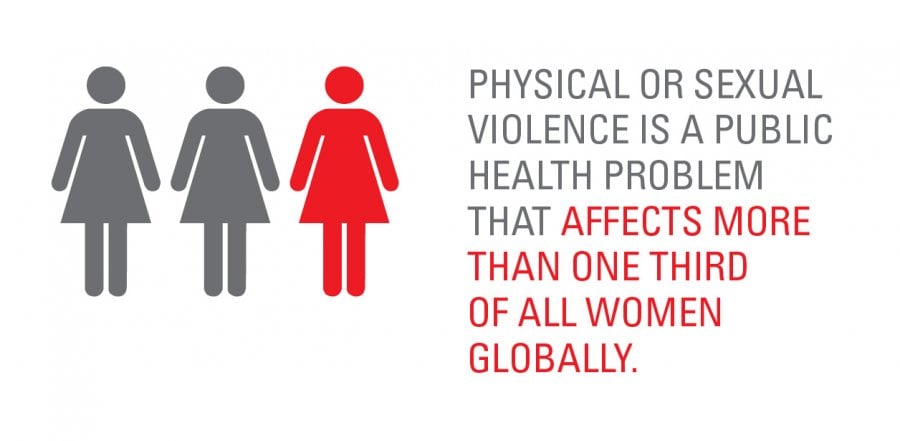£1.3 million grant to improve understanding of causes and consequences of intimate partner violence
6 October 2017 London School of Hygiene & Tropical Medicine London School of Hygiene & Tropical Medicine https://lshtm.ac.uk/themes/custom/lshtm/images/lshtm-logo-black.png
1 in 3 women infographic | Credit; STRIVE
It will be led by the School’s Dr Heidi Stöckl who has been awarded an ERC Starting Grant by the European Research Council (ERC) for £1.3 million over five years, in collaboration with Dr Gerry Mshana from the Mwanza Intervention Trials Unit. The study of 1,200 Tanzanian women, who will be surveyed four times over five years aims to shed light on the main indicators of intimate partner violence (IPV) which will shape future programmes that will improve the lives of women and their families around the world.
ERC Starting Grants are awarded to researchers with 2-7 years of experience since completion of their PhD who also have a scientific track record of great promise and an excellent research proposal.
IPV is a major, under-researched and highly prevalent human rights and public health issue. Worldwide it is estimated that one in three women has experienced physical and/or sexual violence from their intimate partner in their lifetime.
Previous research has identified three key risk factors for IPV: alcohol abuse; indicators of women’s economic status; and poor mental health of either partner. By following the 1,200 women for five years this study will provide high quality information on the changes over time relating to these risk factors, which will be vital to designing future intervention studies.
The research will aim to improve our understanding of the causes and consequences of IPV, and help provide pointers to researchers developing ways of reducing violence, particularly in low- and middle-income countries. Data regarding IPV and the risk factors will be collected from 1,200 women through regular surveys over the five years, with further in-depth interviews of a small group of women adding qualitative information about the women’s lives and surroundings relating to IPV and a separate qualitative study and quantitative survey of men.
This will make this longitudinal study the largest ever conducted on women from low- and middle-income countries who are at risk of IPV.
Dr Heidi Stöckl, Associate Professor in Social Epidemiology and Director of the Gender Violence & Health Centre at the London School of Hygiene & Tropical Medicine, said: “I’m delighted to have received this ERC Starting Grant. Intimate partner violence is a serious public health and human rights issue. One in three women are affected by it during their lifetime, so it’s imperative that we understand what drives this behaviour so that we can prevent and address it.
“The study aims to break new ground in addressing the causes of IPV by providing the strongest evidence-based data yet. We hope this will pave the way for the development of new interventions that could improve the lives of women around the world, particularly in low and middle income countries.”
IPV is a key part of the UN Sustainable Development Goals, which aim to ensure prosperity for all. Theoretical methods to predict the likelihood of intimate partner violence have spanned many different scientific fields. It is hoped that this interdisciplinary study will help to identify future areas for research, as well as new policies and intervention programmes to reduce rates of IPV.
If you enjoyed this article and would like to build a career in global health, we offer a range of MSc programmes covering health and data, infectious and tropical diseases, population health, and public health and policy.
Available on campus or online, including flexible study that works around your work and home life, be part of a global community at the UK's no.1 public health university.